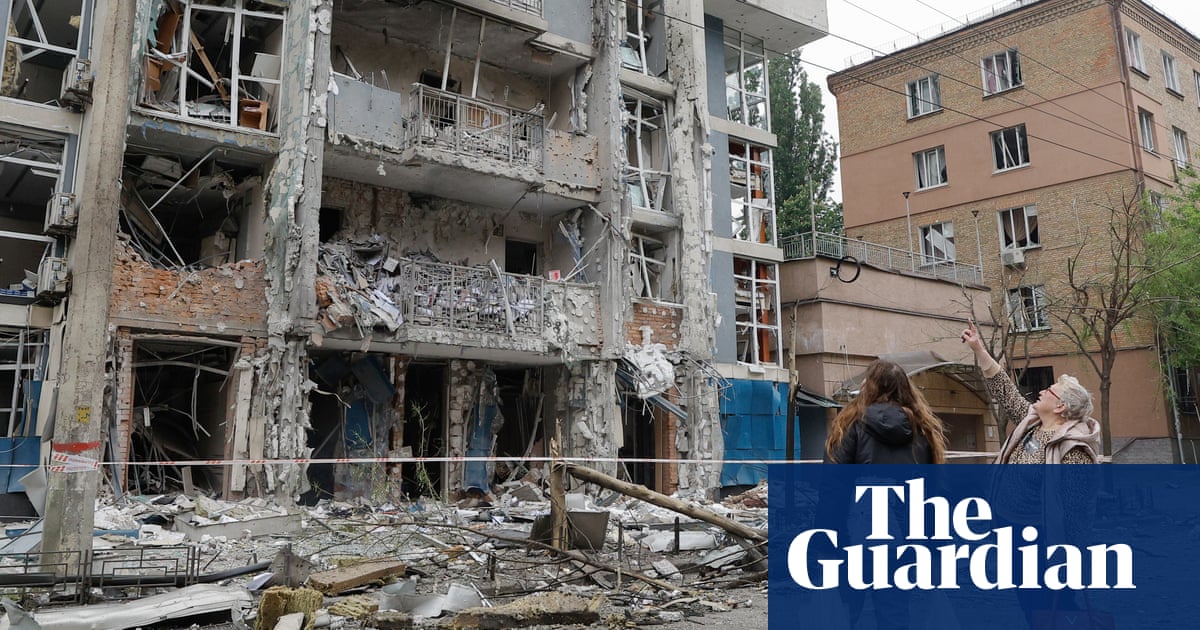The noises in Kyiv in theearly hours of Sunday morningwent like this. First was the staccato sound of the air defences booming on the edge of the city. As those guns stopped, the sound of drone motors approaching was audible, getting quickly louder before the briefest moment of silence and then a sudden detonation.
But, after two days of heavy Russian air raids that hit civilian buildings across Ukraine, there has been only silence fromDonald Trump.
In the space of just over a week, since the first direct talks between Russia and Ukraine since March 2022broke up inconclusivelywith no sign of a ceasefire, the failure of his intervention has become clear.
Boasting before his inauguration as US president that he could end the war in 24 hours, he has instead emboldened the Russian president,Vladimir Putin, by declining to impose pressure for an immediate ceasefire – backed by Europe – or meaningful sanctions.
Since Trump’stwo-hour call with Putinlast Monday, the Russian leader has made clear his disdain even as Trump’s own Defense Intelligence Agency predicted that Moscow would continue fighting through this year.
In the aftermath of the call, Putin has ordered the creation of a “security buffer zone” along Ukraine’s eastern border.Strikes on civilian targets only seem to be accelerating, culminating in two straight days of air raids, including Saturday night’s – the heaviest aerial bombardment of the war so far, with almost 300 drones and nearly 70 missiles.
Ukrainian and western officials anticipate thatRussiawill once again attempt a large-scale offensive during the summer, even if they are highly sceptical that it will be effective given Moscow’s punishing losses.
The reality is that with deadlock on the ground, the escalating long-range drone war on both sides is becoming ever more significant, even if it cannot conquer territory.
As it has become ever larger, with Russian and Ukrainian factories turning out thousands of new drones, it has become more sophisticated with Moscow’s employment of big numbers of decoys and systems designed to fool air defence systems.
While Ukraine has targeted bases and factories, including those producing fibre optic cable for a new generation of small combat zones, the purpose on Russia’s side appears aimed solely at undermining morale on the home front. In recent days, drones and missiles have hit apartment blocks, homes and a student dormitory.
On Sunday the Ukrainian president,Volodymyr Zelenskyy, angrily denounced “the silence of America … encouraging Putin”. His words raised a more critical question: whether Trump, as he has long threatened, has already walked away from his perfunctory efforts to end the war.
Phillips O’Brien, a professor of strategic studies at the University of St Andrews, has suggested in his newsletter on the war that, far from the recent talks heralding any hopes of a breakthrough, they had in fact removed any pretence that the US-mediated talks were going anywhere.
“On Monday the great charade we have been seeing for months came to an end,” wrote O’Brien this weekend. “The charade was that Trump was trying to negotiate a deal between Ukraine and Russia that would work for both states. The reality was always that Trump was trying to bludgeon Ukraine into making major concessions to Russia and help Putin achieve many of his strategic goals.”
If Trump has already disengaged, that raises a number of difficult questions for Kyiv: will the US continue supplying military aid in sufficient quantities? More crucially,can Europe step intothe diplomatic and military void provoked by that disengagement?
What is clear to Ukrainians, despite the several weeks of headlines over the potential for a breakthrough in peace talks, is that without pressure from Washington, or hugely accelerated aid fromEurope, the war will grind on. And there will be more nights like Saturday’s in their future.
